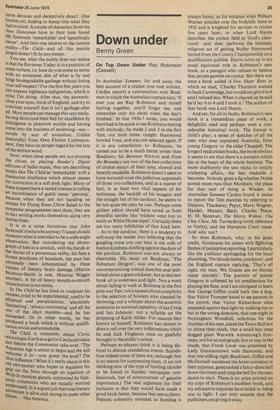Down under
Benny Green On Top Down Under Ray Robinson (Cassell) In Australian Summer, far and away the best account of a cricket tour ever written, Cardus reports a conversation with Bradman in which the Australian captain says, 'If ever you see Ray Robinson and myself batting together, you'll forget me, and remember only his shots when the day's finished.' In that 1936-7 series, you would have had to be quick to see Robinson batting with anybody ; he made 2 and 3 in the first Test, out both times caught Hammond bowled Voce, and was not selected again. If it is any consolation to Robinson, he turned out to be a much better writer than Bradman; his Between Wickets and From the Boundary are two of the best collections of cricket essays of their time, shrewd and breezily readable. Robinson doesn't seem to have matured since the judicious appraisals of those two collections, and as a matter of fact, in at least two vital aspects of his technique, the backlift of his imagery and the straight bat of his candour, he seems to be not quite the man he was. Perhaps some gallant editor should have saved us from dreadful similes like 'wickets were lost as easily as White House tapes'. Certainly there are too many infelicities of that kind here.
As to the candour, there is a tendency to soft-soap the reader into believing that the gurgling noise you can hear is the milk of human kindness sloshing against the door of the pavilion. Robinson was not always so charitable. His essay on Bradman, 'The Reluctant Dragon', was one of the most uncompromising critical sketches ever published about a great cricketer, but in this new book all is sweetness and light. Not a word about failing to walk at Brisbane in the first post-war Test ; not a squeak about complicity in the selection of bowlers who cheated by throwing; not a whisper about the eccentric ascension to national captaincy of Ian Craig and Ian Johnson; not a syllable on the dropping of Keith Miller. For reasons best known to himself, Robinson has chosen to draw a veil over the very indiscretions which he and Jack Fingleton once so gleefully brought to the public's notice.
Perhaps ex-players think it is being disloyal to discuss scandalous events. Scandalous indeed some of them are, although that is no reason for suppressing them. (I am not thinking now of the type of footling idiocies to be found in Sunday newspaper confessionals, but of controversies of genuine importance.) The real argument for their inclusion is that they would have made a good book better, because they are so funny. Pietistic solemnity revealed as humbug is
always funny, as for instance when Pelham Warner presides over the bodyline farce in 1932 and is knighted for services to cricket five years later; or when Lord Harris describes the cricket field as 'God's class room' and then performs the intensely religious act of getting Walter Hammond barred from the County Championship on a qualification quibble. Harris turns up in his usual equivocal role in Robinson's new book, as a paragon who refuses to believe that people gamble on cricket. But there was
once a book called A Few Short Runs in which we read, 'Charley Thornton wanted
to back Cambridge, but would not give 6 to 4 and I refused less. When it cleared up he said he'd lay 6 to 4 and I took it.' The author of that book was Lord Harris.
And yet, for all its faults, Robinson's new book is a tremendous piece of work, a delightful read and perhaps even a con siderable historical work. The format is child's play; a series of sketches of all the
men who ever captained Australia, from young Gregory to the older Chappell. The longer I read cricket books, the more obvious it seems to me that there is a paradox which lies at the heart of the whole business. The more stubbornly the text sticks to strictly cricketing affairs, the less readable it becomes. Nobody gives a fig whether Noble scored more runs than Murdoch; the place for that sort of thing is Wisden. In Australian Summer Cardus found it easier to report the Test matches by referring to Dickens, Thackeray, Pepys, Marx, Wagner, Handel, Mozart, Bach, Charles Peace, H. M. Bateman, The Merry Widow, Chu Chin Chow, Mr Turveydrop (with reference to Verity), and the Hampton Court maze. And why not ?
So does Robinson, who, to his great credit, illuminates his sitters with lightning flashes of perceptive reporting. I particularly like the publican apologising for the local plumbing, 'No bloody baths, you know', and the England captain replying, 'That's all right, my man. We Graces are no bloody water spaniels'. The portrait of punter Gregory is softened by his predilection for playing the flute, and I am intrigued to learn that George Giffen could bark like a dog, that Victor Trumper hated to see parsons in the crowd, that Victor Richardson once appealed against bad light by walking out to bat in the wrong direction, that one night in Nottingham Woodfull, solicitous for the slumber of his men, asked the Town Hall not to chime their clock, that a small boy once dogged giant Warwick Armstrong's footsteps, not for an autograph, but to stay in the shade, that Frank Laver was presented by Lady Gormanstown with diamonds, and that one stifling night Blackham, Giffen and McDonnell wandered the hotel corridors in their pyjamas, gatecrashed a fancy-dress ball down the street and rang the bell for the next dance to start. There is no price printed on my copy of Robinson's excellent book, and my exhaustive inquiries have failed to bring one to light. I can only assume that the publishers are giving it away.














































 Previous page
Previous page